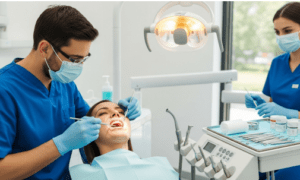Good oral hygiene is essential for overall health, not just for a bright smile. Often underestimated, the connection between oral health and the body’s well-being highlights the importance of integrating dental care into preventive measures. This blog discusses the vital role of oral hygiene and offers steps to enhance both oral and overall health.
Why Oral Health Matters
When you think about your health, how often do you consider your teeth and gums? Oral health often takes a backseat compared to other aspects of physical well-being, but it plays a fundamental role. Poor oral hygiene not only increases the risk of dental issues, such as cavities and gum disease, but has also been linked to more severe health problems, including cardiovascular disease and diabetes.
The mouth is often called the gateway to the body, and for good reason. It is a primary point of entry for bacteria and pathogens. Practicing good oral hygiene creates a barrier that protects your overall health, while neglecting it leaves the door wide open for complications.
The Link Between Oral Health and Overall Well-being
Your oral health is deeply interconnected with your overall health. Here are some of the ways your mouth and body are linked:
1. Cardiovascular Health
Inflamed gums caused by periodontal disease can lead to bacteria entering the bloodstream, which may cause arterial inflammation and increase the risk of heart disease and stroke. Studies show that individuals with gum disease are almost twice as likely to suffer from cardiovascular conditions.
2. Diabetes
Diabetes and oral health have a bidirectional relationship. High blood sugar levels can increase the risk of gum disease, while untreated gum issues can make it harder to control blood sugar levels.
3. Pregnancy and Birth Outcomes
Oral health is critical during pregnancy. Poor oral hygiene has been linked to preterm births and low birth weights, likely due to inflammatory responses triggered by gum disease.
4. Respiratory Health
Bacteria from the mouth can travel to the lungs, increasing the risk of pneumonia and other respiratory infections, particularly in older adults or people with weakened immune systems.
Recognizing these connections underscores the importance of approaching oral hygiene as an integral part of preventive care.
The Preventive Power of Dentistry
Dentistry is about far more than fixing cavities or whitening teeth. At its core, dentistry is a vital preventive healthcare service that can identify and address potential health issues before they escalate.
Regular Check-ups and Cleanings
Routine visits to the dentist play an essential role in maintaining oral health.Regular check-ups at trusted practices like garrett dental ensure that any potential issues are caught early, allowing for timely treatment and preserving your smile.Professional cleanings, like teeth cleaning in Las Vegas, remove tartar buildup that you can’t reach with a toothbrush alone, while check-ups allow dentists to detect issues—such as gum disease or tooth decay—early.
Early Detection of Serious Health Issues
Believe it or not, dentists can sometimes spot signs of systemic illnesses during routine exams. For example, symptoms like dry mouth or red, swollen gums could indicate underlying health problems like diabetes or autoimmune disorders.
Patient Education
Dentists also educate patients on the best practices for maintaining oral health. Learning the right brushing technique, understanding how to floss effectively, and knowing which foods to avoid can make a significant difference.
Common Dental Issues That Impact Overall Health
Ignoring dental care can create a domino effect of health problems. Here are some common dental issues and their potential consequences:
- Gum Disease (Periodontitis): Beyond tooth loss, gum disease is linked to heart disease, diabetes, and respiratory issues.
- Cavities (Tooth Decay): Untreated cavities can lead to infections, abscesses, and even sepsis if the bacteria spread beyond the oral cavity.
- Tooth Loss: Missing teeth can affect your ability to chew and absorb nutrients properly, contributing to dietary deficiencies.
- Oral Cancers: Early detection by a dentist can significantly improve survival rates for oral cancer.
By addressing these conditions early, you not only save your teeth but also protect your entire body.
Tips for Maintaining Good Oral Hygiene
Good oral hygiene habits can go a long way in safeguarding your health. Here’s how you can keep your smile in great shape:
1. Brush Twice Daily
Use a soft-bristle toothbrush and fluoride toothpaste. Brush for at least two minutes, making sure to reach all surfaces of your teeth.
2. Floss Daily
Flossing removes food particles and plaque trapped between teeth, where your toothbrush can’t reach.
3. Use Mouthwash
Consider an antimicrobial mouthwash to reduce bacteria in your mouth and fight bad breath.
4. Eat a Balanced Diet
Limit sugary foods and beverages, which can promote tooth decay. Instead, consume a diet rich in fruits, vegetables, lean proteins, and whole grains.
5. Stay Hydrated
Water helps wash away food particles and bacteria, reducing the risk of cavities and gum disease.
6. Visit Your Dentist Regularly
Even with excellent at-home care, you should visit your dentist every six months for a professional cleaning and check-up.
Adhering to these simple tips can help you maintain not only a healthy mouth but also a healthy body.
The Future of Dentistry and Public Health
The field of dentistry is continuously evolving, integrating new technologies and research to improve outcomes. Advances such as AI-driven diagnostics, teledentistry, and 3D printing are making dental care more accessible, personalized, and efficient.
Dentistry’s role in public health is also expanding. Initiatives to increase access to dental care in underserved communities and public awareness campaigns about the oral-systemic health connection aim to improve overall well-being on a societal level.
Oral Health Is a Gateway to Overall Health
Understanding the connection between oral hygiene and overall health should inspire you to prioritize your dental care. Incorporating good oral hygiene practices into your daily routine, coupled with regular dental check-ups, can lead to profound health benefits.
If you’re looking for expert guidance or need to schedule a dental check-up, reach out to a trusted dentist in your area. Remember, taking care of your teeth is an investment in your overall health!
Conclusion
Now that you know the far-reaching implications of poor oral hygiene, it’s clear that regular dental care is essential for maintaining overall health. By taking good care of your teeth and gums, you’re not only keeping your smile bright but also safeguarding your entire body from potential health issues.



































